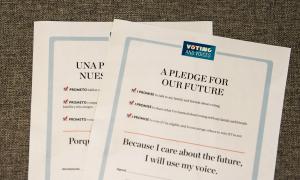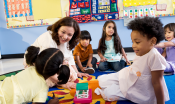4,319 Results
Extreme Prejudice

Pledge to Participate!

Uplift Honest History and the Power of Place
The latest issue of Learning for Justice magazine focuses on the South in the fight for democracy and justice. That entails acknowledging those at the center of an unjust system, whose very survival served as a form of resistance. In these new stories, Amber N. Mitchell details the ways in which the Whitney Plantation experiential learning tour sheds light on the lives of the people whose enslavement generated great wealth for their captors, and Lolita Bolden celebrates her Southern roots in both prose and poetry.
- Survival, Resistance and Resilience
- Where I’m From
- Centering Diverse Parents in the CRT Debate
Social Justice Education Is Essential
In the current hostile learning environment created by censorship laws and policies aimed at prohibiting the teaching of honest history and further marginalizing LGBTQ+ students and educators, social justice education is essential. The Learning for Justice Social Justice Standards are designed to guide educators in developing inclusive curricula to make schools safer and more just and equitable. Comprised of four domains—identity, diversity, justice and action—the Social Justice Standards are intended for all content areas alongside state and Common Core standards.
- Social Justice Standards
- Digging Deep Into the Social Justice Standards: Identity
- Digging Deep Into the Social Justice Standards: Diversity
Freedom To Read, Freedom To Learn
May 3 is the Freedom To Learn National Day of Action, a day of advocacy for inclusive education and young people’s freedom to read, learn and build a just future. Our collective responsibility is to counter disinformation, uplift honest history and engage our communities to serve all children.
- Freedom To Read, Freedom To Learn
- Exclusion Is Unconstitutional
- A Call for Anti-Bias Education
How to Be an Ally in the Classroom

Change Starts Here (With Me): Day of Action, March 2025
Join us for a Day of Action on March 7 (or any day in March that works for you) — and organize with young people in your community. As we commemorate the 60th anniversary of the 1965 Selma to Montgomery march, it is your time to step forward, just as the young people did then, and say, “Change starts here.” Your voice, your energy and your activism are essential in shaping today’s movements for justice.
- Change Starts Here (With Me): Day of Action Toolkit
- Introduction to Action Planning: Toolkit
- Youth Learning For Justice